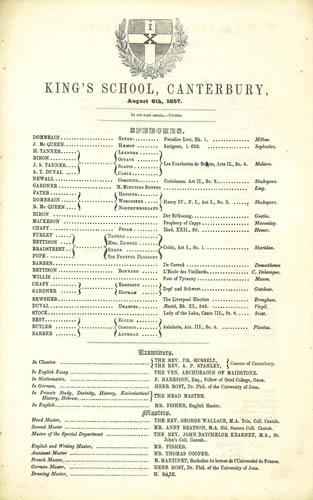Walter Pater was at the King’s School from 1853 to 1858. His Emerald Uthwart (1892) is a strongly autobiographical work.
“Regular, submissive, dutiful to play also, Aldy meantime enjoys his triumphs in the Green Court; loves best however to run a paper-chase afar over the marshes, till you come in sight, or within scent, of the sea, in the autumn twilight; and his dutifulness to games at least had its full reward. A wonderful hit of his at cricket was long remembered; right over the lime-trees on to the cathedral roof, was it? or over the roof, and onward into space, circling there independently, minutely, as Sidus Cantiorum? …
“Meantime however, the University, with work in preparation thereto, fills up the thoughts, the hours, of these would-be soldiers, of James Stokes, and therefore of Emerald Uthwart, through the long summertime, till the Green Court is fragrant with lime blossom, and speech-day comes, on which, after their flower-service and sermon from an old comrade, Emerald surprises masters and companions by the fine quality of a recitation; still more when “Scholar Stokes” and he are found bracketed together as “Victors” of the school, who will proceed together to Oxford. His speech in the Chapter-house was from that place in Homer, where the soul of the lad Elpenor, killed by accident, entreats Ulysses for due burial rites. “Fix my oar over my grave,” he says, “the oar I rowed with when I lived, when I went with my companions.” …
“They had always been great in speech-making, in theatricals, from the days when the Puritans destroyed the Dean’s “Great Hall” because “the King’s Scholars had profaned it by acting plays there”; and that peculiar note or accent, as being conspicuously free from the egotism which vulgarises most of us, seemed to befit the person of Emerald, impressing weary listeners pleasantly as a novelty in that kind. Singular! – the words, because seemingly forced from him, had been worth hearing. The cheers, the “Kentish Fire”, of their companions might have broken down the crumbling black arches of the old cloister, or roused the dead under foot, as the “Victors” came out of the Chapter-house side by side; side by side also out of that delightful period of their life at school, to proceed in due course to the University.”
An annotated version can be seen in Imaginary Portraits, edited by Lene Østermark-Johansen.

